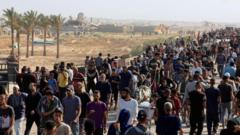Tensions in the region escalate as a new Israeli aid distribution program in Gaza draws ire from the U.N. and humanitarian groups, further complicating the ongoing crisis.
U.N. Criticizes Israel's New Aid Plan for Gaza Amid Tensions

U.N. Criticizes Israel's New Aid Plan for Gaza Amid Tensions
A new Israeli-backed aid initiative for Gaza faces condemnation from the U.N. after a chaotic start raised concerns over its efficacy and adequacy.
In a controversial move, the United Nations has expressed strong disapproval of an Israeli-supported initiative aimed at delivering aid in southern Gaza. This development comes after the program's chaotic launch, which saw thousands of desperate individuals flock to a food distribution center where Israeli forces had to fire warning shots to manage the crowd. The Israeli government has stated that this new operatio,n dubbed the Gaza Humanitarian Foundation, is intended to bypass both Hamas and the U.N., which are often criticized by Israel for being ineffectual and biased.
The recent surge in international condemnation correlates with Israeli Prime Minister Benjamin Netanyahu's plans for a potential ground offensive against Hamas, following a two-month blockade on humanitarian assistance that concluded just last week. Many Western countries and humanitarian organizations have refrained from supporting the new initiative, labeling it dangerously insufficient considering the dire humanitarian conditions in Gaza.
The initiative has set up several distribution points, which are protected by Israeli soldiers and overseen by private U.S. contractors. While Israeli officials advocate for the new strategy, arguing that the U.N. failed to mitigate the hoarding of supplies by Hamas, significant backlash continues from various diplomatic channels, particularly within Europe. Kaja Kallas, the European Union’s chief diplomat, condemned what she perceived as the disproportionate use of force and insisted that humanitarian actions must not be politicized or militarized.
In summation, the initiative's beginning on Wednesday, marked by disorder and criticism, raises significant questions about not only its operational effectiveness but also its broader implications for humanitarian efforts in one of the world's most volatile regions. As Israel pushes forward with its plans, the international community remains on alert regarding the potential escalation of violence and its repercussions on the civilian population in Gaza.
The recent surge in international condemnation correlates with Israeli Prime Minister Benjamin Netanyahu's plans for a potential ground offensive against Hamas, following a two-month blockade on humanitarian assistance that concluded just last week. Many Western countries and humanitarian organizations have refrained from supporting the new initiative, labeling it dangerously insufficient considering the dire humanitarian conditions in Gaza.
The initiative has set up several distribution points, which are protected by Israeli soldiers and overseen by private U.S. contractors. While Israeli officials advocate for the new strategy, arguing that the U.N. failed to mitigate the hoarding of supplies by Hamas, significant backlash continues from various diplomatic channels, particularly within Europe. Kaja Kallas, the European Union’s chief diplomat, condemned what she perceived as the disproportionate use of force and insisted that humanitarian actions must not be politicized or militarized.
In summation, the initiative's beginning on Wednesday, marked by disorder and criticism, raises significant questions about not only its operational effectiveness but also its broader implications for humanitarian efforts in one of the world's most volatile regions. As Israel pushes forward with its plans, the international community remains on alert regarding the potential escalation of violence and its repercussions on the civilian population in Gaza.




















